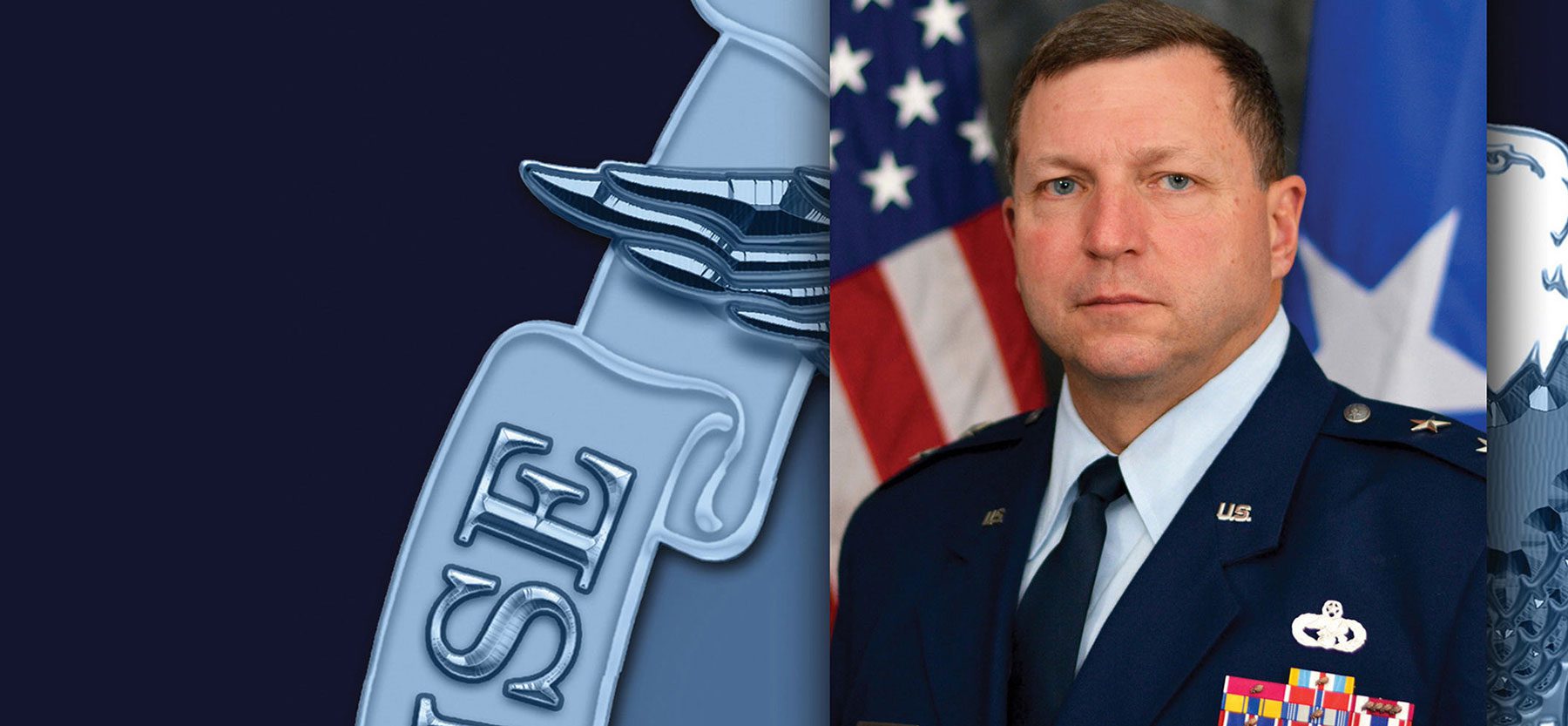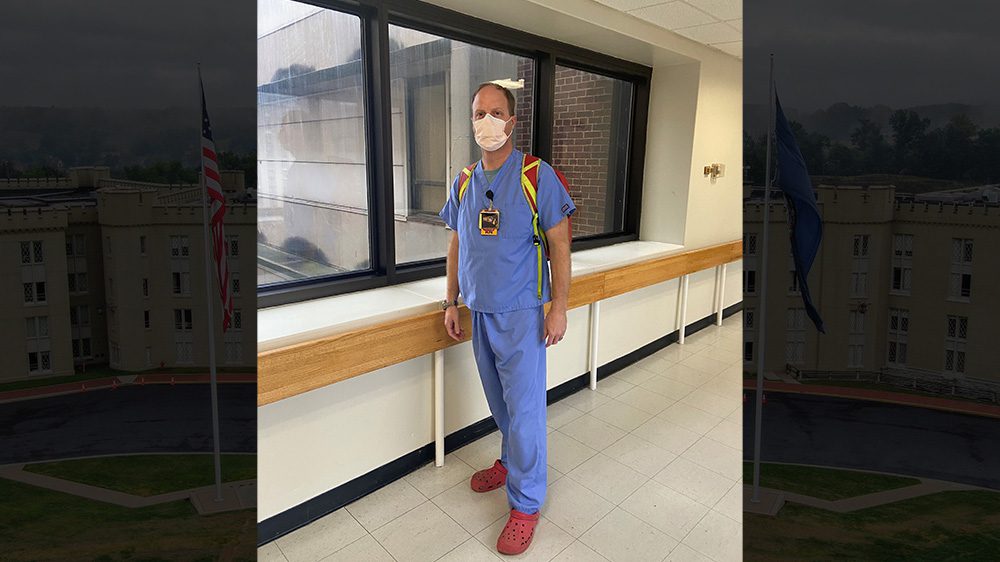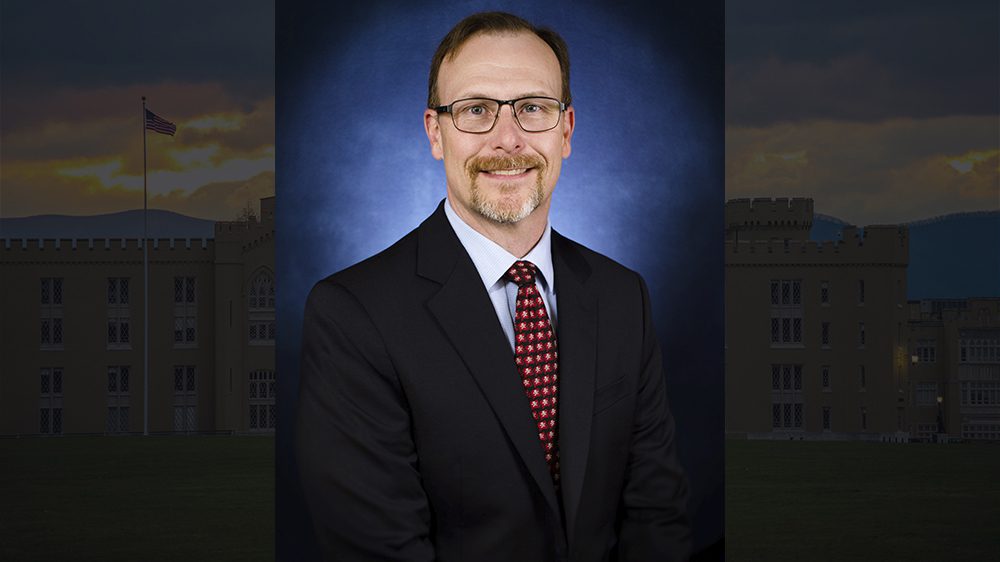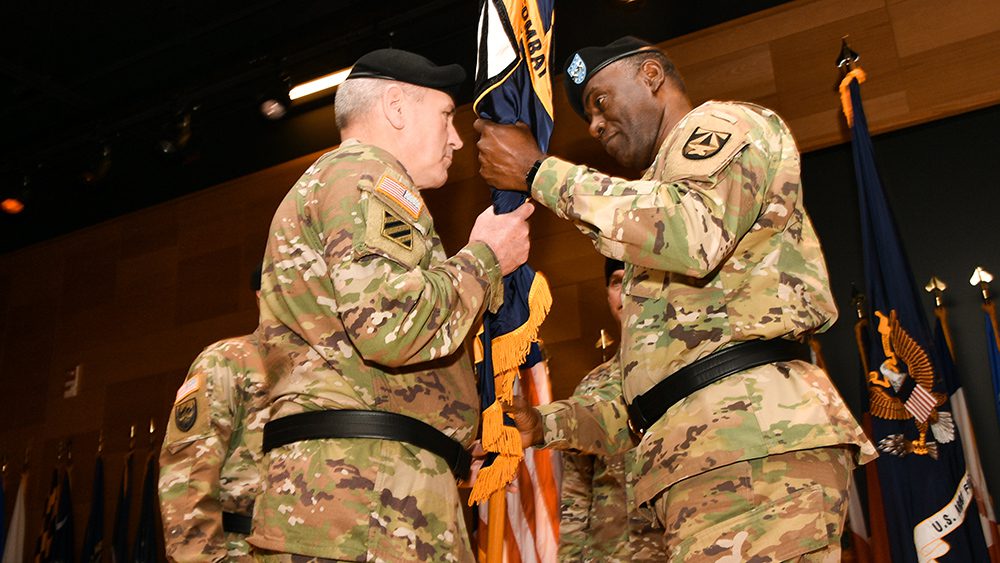A cold chill envelops Air Force Maj. Gen. Mark Johnson ’87 as he steps up to the McNamara Headquarters Complex main entrance, passing a memorial plaque that pays homage to the first director of the Defense Logistics Agency.
“What will you do for our troops today?” the face engraved onto the metal plate seems to ask. The image he sees and voice he hears belong to the man who took him to baseball games and fishing as a boy. “To me, he was just Grandpa or Daddy Mac,” Johnson said. It feels surreal to him, running daily operations for an agency his grandfather, Army Lt. Gen. Andrew T. McNamara, built from nothing in 1961. It was known then as the Defense Supply Agency.
Growing up, Johnson listened to McNamara chronicle the challenges of centralizing supply chain management for the Department of Defense.
“I remember him talking about how difficult it was to stand up the organization because none of the services wanted to do it, and I thought, ‘Why doesn’t somebody just tell them they’re going to do it anyway?’” he said. More than 50 years later, Johnson understands why it was so hard.
“The agency still fights some of those tensions today,” he said, referring to the push-pull between DLA and the services as they work together to make logistics support seamless and affordable.
Johnson has twice been a senior leader at DLA, first as director of DLA Aviation from March 2013 to March 2015. After a two-year tour at Tinker Air Force Base, Oklahoma, he returned to the agency in July 2017 to oversee DLA Logistics Operations. He retired April 26 with 32 years of service.
After graduating high school, the Richmond, Virginia, native longed for more than textbooks and exams. While many of his friends took off for Virginia Tech or the University of Virginia, he lagged behind.
“To be perfectly honest, I didn’t get accepted. I applied to five schools and didn’t get into any of them,” he said. A buddy lured him to the Virginia Military Institute and even there he stumbled as a student.
“I don’t test well,” he confessed. “I had to go into final exams with all A’s in order to come out with a C, because I knew I was going to flunk the final.”
A fascination with airplanes – their noise, their speed – drew Johnson to the Air Force. In 1988, he arrived at his first assignment as a supply operations officer at Chanute Air Force Base, Illinois. There wasn’t a plane in sight.
“I was really disenchanted,” he said of his time at the training base. The Air Force sent him next to Okinawa, Japan, and into the hands of then-Air Force Lt. Col. Michael Van House at the 18th Supply Squadron. Johnson’s excitement for military service reignited as he led combat operations support.
“He would do innovative things to put us at the top of our readiness rate, like having his airmen call all over the world to locate parts and get them shipped in so we could use them to deploy with our fighter aircraft,” said Van House, who now works for Johnson as deputy executive director of operations for DLA Logistics Operations.
In 1996, Johnson was reassigned to Hurlburt Field, Florida, as a supply staff officer and aide to then-Air Force Maj. Gen. Charles R. Holland, commander of the Air Force Special Operations Command.
Carrying the two-star general’s bags all over the world, Johnson learned that the Air Force is made up of teams specializing in everything from operations and maintenance to logistics and personnel. Holland taught him that all those teams must work in unison to accomplish the mission. He also taught the budding young officer how leaders develop their strategies as he laid out his plans for special operations forces of the future and the reasons behind the decisions he made as a commander.
“I watched him lay his strategy out for what he was trying to do, and I got to see the services buy into that. And then over the course of the next 10 or 15 years, I watched all that stuff evolve,” Johnson said.
Ten years later, Johnson became the director of logistics for the Joint Special Operations Command at Fort Bragg, North Carolina, working for then-Army Lt. Gen. Stanley McChrystal. He learned that “What we do matters. Why we do things matters. How we do things matters. And it matters enough that people’s lives are at stake.”
He set up logistics networks for JSOC teams around the world as McChrystal transformed the command to face a changing global environment.
Johnson was heading the 1st Special Operations Mission Support Group in 2010 when a magnitude 7.0 hurricane struck Haiti and killed 300,000 people. He deployed with 12 hours’ notice to set up a Haiti Sustainment Cell and reopen the Port-au-Prince Airport. It’s one of his proudest moments in uniform.
“We took a devastated airfield and turned it into an airport that was landing and taking off about 110 flights a day, bringing in supplies,” he said. “It was unbelievable – no power, no running water, buildings that we were concerned were going to fall over in the next earthquake.”
Despite his success and reputation, Johnson was surprised to be named commander of DLA Aviation in 2013. He’d known it as Defense Supply Center Richmond, a building 15 miles from his childhood home where many of his high school classmates eventually went to earn a living.
“Think about that,” he said. “What are the chances of being able to go back to my hometown and work in a place where my stepdad worked?”
Serving at DLA Aviation helped Johnson understand the complexity of DLA’s business and how different processes worked best for different supply chains.
His grandpa’s vision for the agency guided Johnson’s days at DLA Headquarters. Framed above his desk were these words once spoken by McNamara: DLA exists to provide effective logistics support to the warfighter at the most efficient cost to the taxpayer.
The statement mirrors objectives in the agency’s current strategic plan as well as DOD’s current reform goals.
“All the reforms are centered around more support to the warfighter at the best cost to the taxpayer. So here we are in 2019 trying to reinvent what he [McNamara] had to do in 1961,” Johnson said.
The people who make it happen are what Johnson said he will remember most about his time at DLA. “Everybody is bending backward to try and make life better for soldiers, sailors, airmen and Marines all over the world. It doesn’t matter where they are in the organization, what level they are in, that’s their focus,” he added. “As a person in uniform, that’s comforting and refreshing to know.”
DLA employees like Jason Hardman, a program manager for DLA Energy, say the agency will lose a strong leader, a man who valued people. Unlike officers who lose touch with the fact that they, too, were once first and second lieutenants, Johnson remembers his roots, Hardman said.
“He remembers where he came from and treats everybody with dignity and respect. He’s probably the best guy you could ever work with,” he said, recounting the time in 2017 and 2018 when he served as Johnson’s aide. “He’s the kind of guy who looks at the 99 things you did right instead of the one thing you did wrong, and he never lost faith in me,” Hardman said.
Van House called Johnson a gifted officer who makes those around him want to excel. “He’s just adept at that. He’s got a personality that makes airmen want to follow him off the cliff,” Van House added.
Johnson believes his grandpa, who died in 2002, would’ve been proud of his leadership style and contributions to the organization he founded, even though he’d say there’s more to be done.
“He probably would’ve said I left some stuff on the table, but that’s because he was always about getting more done,” he said, adding that he feels blessed to have had the opportunity to be part of what he considers “the family business.”
As for how he managed to follow some of McNamara’s footsteps and why, Johnson pointed to “divine intervention.” Van House agreed. But personal drive and hard work played roles, too.
“The common thread with General Johnson is whatever job he was given, he did the absolute best he could in that job, and that made the difference that got him his next job,” he said.
Johnson and his wife, Candy, will retire in Danville, Indiana, where he hopes to run a manufacturing business. The dream is a result of time he spent running the Oklahoma City Air Logistics Complex, where he enjoyed being on the production floor among mechanics and airplane parts.
Johnson matriculated from Colonial Heights, Virginia, and earned a Bachelor of Arts degree in economics from VMI. He also holds degrees from Embry-Riddle Aeronautical University and the U.S. Army Command and General Staff College, and attended the Air War College.
(Author’s note: Johnson is related to McNamara by marriage. His natural father was a West Point graduate who died in Vietnam in 1965 when Johnson was just a year old. His mother remarried into the McNamara family when Johnson was 3.)




